- Home
- David Downing
The Dark Clouds Shining
The Dark Clouds Shining Read online
Books by David Downing
The John Russell series
Zoo Station
Silesian Station
Stettin Station
Potsdam Station
Lehrter Station
Masaryk Station
The Jack McColl series
Jack of Spies
One Man’s Flag
Lenin’s Roller Coaster
The Dark Clouds Shining
Other titles
The Red Eagles
Copyright © 2018 by David Downing
All rights reserved.
Published in the United States by
Soho Press, Inc.
853 Broadway
New York, NY 10003
Library of Congress Cataloging-in-Publication Data
Downing, David, 1946–
Title: Dark clouds shining / David Downing.
A Jack McColl novel
ISBN 978-1-61695-606-6
eISBN 978-1-61695-607-3
1. Intelligence officers—Great Britain—Fiction. 2.Women
journalists—Great Britain—Fiction. 3. Espionage, British—Fiction. I. Title
PR6054.O868 D37 2018 823’.914—dc23 2017029033
Interior design by Janine Agro, Soho Press, Inc.
Printed in the United States of America
10 9 8 7 6 5 4 3 2 1
There’s a silver lining,
Through the dark clouds shining,
Turn the dark cloud inside out
Till the boys come home.
(from “Keep The Home Fires Burning,”
lyrics by Lena Ford, 1914)
A curtain was lifted, a light briefly shone,
a swift shadow fell down the wall and was gone.
(Vladislav Khodasevich, 1922)
THE DARK CLOUDS SHINING
March 1921
A Simple Act of Violence
The Harrow courtroom was in a shabby condition; like so much else it was still waiting for a postwar recovery. The large expanses of wood paneling looked like they hadn’t been polished for years, which was somewhat surprising given the number of people outside yearning for gainful employment.
The railing in front of Jack McColl was shiny enough, presumably greased by the sweating palms of previous defendants. It wasn’t the first time he’d stood in a dock, but he’d never been alone in one before, and for some reason the experience felt less stressful. Perhaps because he had only himself to worry about.
He was glad his mother hadn’t come down from Scotland. She had visited him in Pentonville a week or so earlier, and he had obviously convinced her that there was little point. He had refused her offer to pay for a better lawyer for much the same reason. Moral support was always nice, but she didn’t have that much money to spare, and both of them knew it would have been wasted.
The mere fact that the authorities had gone for a jury trial suggested, at least to McColl, that the outcome was a foregone conclusion, and that the Crown’s chief concern was to maximize his sentence. The jury, of course, might prove awkward, but nothing in the faces of its members suggested any sympathy with his case. The judge, a white-haired man in his sixties, had been palpably hostile from the outset. According to one newspaper that McColl had seen, the judge was known as “the Met’s best friend,” some accolade when London’s police force was clearly spoiled for choice in that regard.
And some choice when the alleged crime concerned the serious injuring of a policeman. The officer, PC Owen Standfast—even the name seemed like an accusation—was still, ten weeks later, in too frail a state to attend the court. Or so it was claimed. McColl had his doubts, but admitted he might be doing the man an injustice. It was, after all, his instant aversion to PC Standfast that had set his fist on its face-bound trajectory.
The police constable had been well enough to recall and describe the events in question, and the middle-aged detective inspector now entering the witness box was armed with the interview transcript. He began by explaining the reasons for PC Standfast’s nonappearance, and then announced, apropos of nothing, that the constable had decided on doctor’s advice to take early retirement. When McColl’s state-provided counsel protested that this statement might be prejudicial, the judge reluctantly agreed, and advised the jury to forget they had heard the offending words.
The inspector started reading Standfast’s testimony, his voice rather loud for the mostly empty courtroom, his tone suggesting a penchant for amateur dramatics. PC Standfast had first observed the vehicle—a Ford Model T—coming toward him on Preston Road at around four o’clock in the afternoon. It had been traveling in the center of the highway at what he considered an excessive speed. Only a few seconds later it had abruptly swerved to the left and crashed through the plate-glass window of number 146, the Eternal Rest Funeral Parlour. PC Standfast had hurried toward the scene—a distance of about a hundred yards—worried that someone might be badly hurt, but on reaching the spot had found two men in the automobile’s front seats laughing hysterically. The man behind the wheel, half of whose face was covered by one of those tin masks commonly worn by soldiers who’d suffered facial disfigurement in the war, was so taken by the humor of the situation that he was rhythmically beating his hands on the steering wheel.
All true, McColl thought, aware of the stares of several jurors. His and Nate Simon’s sudden confrontation with a window display of coffins had, at the time, seemed a joke of almost cosmic proportions.
“I see you still find this amusing,” the judge commented, noticing McColl’s involuntary smile.
“You had to be there,” McColl replied.
The judge gave him a contemptuous look and invited the inspector to continue. According to PC Standfast, he had been about to order the two men out of the automobile when he noticed that the driver, Nathaniel Simon, had no legs. The vehicle had been adapted for his use, hand levers bolted to the foot pedals in what appeared a highly slapdash manner.
“Mr. Simon chose to end his own life in police custody, I believe,” the judge noted.
“Yes, m’lud,” the inspector said.
“One might consider him the second victim,” the judge went on, looking at the jury.
One could if one wanted to influence the verdict, McColl thought. Though only a fool would deny that Nate had been a victim.
Thinking it unlikely that a man with no legs would step out of the car, PC Standfast had asked the man in the passenger seat to do so.
“The defendant, Jack McColl?”
“Yes, m’lud.”
PC Standfast had then asked Mr. McColl to help him get the driver out of the car. At which point Mr. McColl had punched PC Standfast in the face, causing him to fall backward and—as he discovered much later—to hit his head on the edge of the roadside curb. “PC Standfast was in a coma for five weeks,” the detective added helpfully.
He was dismissed with fulsome thanks and the lack of any opportunity for the defense to question or challenge the absent witness blithely noted. Two other witnesses were duly heard and confirmed the basic outlines of the incident—neither had been close enough to hear the exchange of words. By the time the second man left the stand, it was almost noon, and the judge was apparently hungry. The case for the defense would be heard that afternoon.
McColl was escorted back down to the basement for his own feast—a chunk of yesterday’s bread with a slice of ham, washed down with a decent mug of tea. It was an improvement on the fare at Pentonville, to which he assumed he would soon be returning. He was resigned to a lengthy sentence, and much of the
time was inclined to think he deserved one, if not for this particular crime. He had the feeling that things were finally catching up with him, that his ham-fisted search for atonement had been finally deemed insufficient by some nebulous higher authority.
As was often the case at such moments, his thoughts went back to that day in Moscow, almost three years before. The anguished look on the young boy’s face when McColl had told him he couldn’t take him to England. Eleven-year-old Fedya, whom McColl had chanced across in a far-off village while on his way to Moscow, and whom he’d taken with him partly for the camouflage that a child in tow would provide. Fedya, who had refused to take no for an answer, followed McColl from the orphanage, and then been caught in the middle when Cheka agents chasing McColl had recklessly opened fire. His old enemy Aidan Brady, then serving with the Moscow Cheka, had probably fired the fatal shot, but McColl had felt responsible. He had brought the boy to Moscow and stupidly put him at risk.
That heartbreaking day in the summer of 1918 had been only the first of several—in the months that followed his brother Jed had been taken by the Spanish flu, and Caitlin Hanley, the Irish-American love of McColl’s life, had decided that the Russian Revolution meant more to her than he did. Her decision to stay on in Moscow had effectively ended their long on-off affair, and a subsequent letter had formalized the break. His career with the Secret Service had already ended after he’d sabotaged a plot by the Service’s Russian allies to poison Moscow’s food supply.
McColl and his mother had helped each other through their months of grief over Jed. In truth, she’d been in much better shape than McColl had, and her continued immersion in the postwar radical politics of Glasgow’s Clydeside had provided a focus that his own life lacked. Then in the spring of 1919, he’d received a letter from London. Long before the war, in what seemed another age, McColl had met and married Evelyn Athelbury, and gone on to work for her brother Tim, a designer and manufacturer of luxury automobiles. It was the opportunities implicit in hawking these vehicles around the world that had first persuaded Mansfield Cumming, the head of Britain’s new Secret Service, to enlist McColl as a part-time spy.
Already aware that Evelyn had died in the postwar flu epidemic, he had learned from the letter that her brother had recently succumbed to one of the more aggressive cancers. Before dying, Tim had advised his younger sister Eileen—the letter’s author and his sole beneficiary—that she should seek McColl’s advice on the future of the firm. Would he be willing to visit her in London and do as her brother had suggested?
McColl had been reluctant, but his mother had persuaded him that the change would do him good. Eileen, an attractive widow in her late thirties with a traumatized eleven-year-old son, had asked him if he could take a week or two to decide on which was the sensible course—selling the firm outright or finding a new man to manage it for her. The business, as McColl soon realized, was nothing like its prewar self—the days of small automobile manufacturers were rapidly drawing to an end, and Athelbury’s was now little more than an upscale garage that specialized in servicing luxury cars. But the buildings were sound, the equipment mostly up-to-date, and the Swiss Cottage location a good one for the trade in question.
McColl had taken on its renaissance, hiring a one-armed mechanic named Sid whose skills were far greater than his own and making his home on the premises. He liked Eileen, and when she suggested they share the office cot, his body didn’t get the argument that it probably should have. Over the next six months, they made love once or twice a week, and it was only when she suggested marriage that he realized how serious she was about him.
He couldn’t face the responsibility, for her or her son, who sometimes even looked like Fedya, if only in McColl’s imagination.
He had built her a thriving business, and she let him go without any rancor. McColl had learned a lot from the one-armed mechanic and soon found another job at a garage in Wembley. With someone else doing all the paper work, he had more time for the disabled veterans’ group, which Sid had introduced him to, and spent much of his spare time ferrying men with missing limbs around London. On several occasions his passengers were bound for demonstrations outside Parliament or one of the ministries, and twice he found himself involved in skirmishes with the police.
Waiting for a passenger on one occasion, it occurred to him that a car could be adapted for disabled use. He arranged to meet Sid for lunch at a pub on the Finchley Road, and the two of them had enjoyed a long and liquid discussion of the possibilities. In the eight months since, they’d experimented with all sorts of bespoke adaptions for the myriad forms of maiming suffered in the war, often in vain but sometimes with heartwarming success. The vehicle that Nate Simon had driven through the funeral parlor window had been one of their simpler jobs, and McColl was still at a loss as to what had gone wrong. He suspected that Nate—not the sanest of men since losing half his face and limbs—had done it deliberately, but now he would never know. Nate was beyond questioning, by McColl or the jury upstairs.
“I would like to take you through Police Constable Standfast’s statement to the police,” the defense attorney began.
McColl nodded.
“He said that the car was traveling at excessive speed in the middle of the road. Do you agree?”
“In the middle of the road, perhaps. There was, as far as I remember, no other vehicle in sight. At excessive speed? I would guess we were traveling at around twenty-five miles per hour, which few drivers would consider excessive in this day and age.”
“I think we can agree that the automobile took a sudden turn to the left, before mounting the pavement and crashing into the funeral parlor?”
“Yes.”
“Can you explain why that happened?”
“It certainly had nothing to do with the modifications we had made to the car. They were still in perfect working order.”
“How do you know that?” his counsel asked.
“I used them myself to drive the constable to hospital.”
“So what do you think happened?”
McColl hesitated. He was reluctant to point the finger at Nate Simon, because of how it might reflect on other disabled drivers, but the truth was the truth. “I think Nate—Mr. Simon—had a moment of madness. He saw the sign above the funeral home—‘the best care for your loved ones’—and something just snapped.”
“Were you ‘laughing hysterically’ when PC Standfast arrived on the scene?”
“We were. It just seemed so appropriate somehow, after everything that happened in the war, to find ourselves literally in death’s lap. It wasn’t as if anyone had been hurt.”
“Quite. So what happened next?”
“Mr. Simon took off his mask, something he often did when confronted by figures of authority.”
“With the intention of upsetting the person in question,” the judge interjected, with only the slightest hint of inquiry.
McColl took it in his stride. “He liked to make people aware of the sacrifices he and others had made for their country.”
“But a provocative act, nonetheless,” the judge insisted.
“If you say so,” McColl said dryly.
The judge considered another verbal intervention, but opted instead for simply shaking his head.
“How did PC Standfast react?” the defense counsel asked McColl.
“He blanched. Which was not an unusual reaction—Mr. Simon’s face was quite shocking at first sight.”
“And did he ask you to help him get Mr. Simon out of the automobile?”
“In a manner of speaking. He said: ‘Get this monster out of the car.’”
“Those were the exact words he used?”
“Yes.”
“And what happened next?”
“I punched him,” McColl admitted.
“Because of what he called your friend?”
“Yes,” M
cColl said, more hesitantly than was sensible. How could he explain the years of pent-up anger and anguish that had gone into that punch?
“And when you saw that the constable had struck his head on the curb, and was probably seriously hurt, what did you do?”
“I drove him to Harrow Cottage Hospital.”
“Did Mr. Simon accompany you?”
“Yes, I helped him into the passenger seat.”
“Was he upset?”
“I think so. He refused to put his mask back on.”
“One last question, Mr. McColl. If PC Standfast was unconscious, what was to stop you simply driving away and leaving him and avoiding the situation in which you now find yourself?”
“Humanity, I suppose. It didn’t occur to me. I never had any intention of seriously hurting the constable, and I certainly didn’t want his death on my conscience.”
“Thank you, Mr. McColl.”
The prosecution counsel was already on his feet. “Just a few questions, Mr. McColl. First, we have only your word for it that PC Standfast used such an ugly term to describe Mr. Simon. That is true, is it not?”
“The only other person there was Mr. Simon. And as far as I know, he never spoke again.”
“And yet one might assume that a person so insulted might make some sort of protest?”
“Perhaps Mr. Simon had a better idea than you do of how effective such a protest might prove.”
“Perhaps. But this uncorroborated insult provides you with a most convenient line of defense, does it not? Without it, you’re just someone with a hatred of authority, a very short temper, and a disposition to violence.”
McColl smiled at that. “That would be true if I were making it up. But I’m not.”
The prosecution counsel shrugged his disbelief. “As a matter of fact, we have only your uncorroborated word that Mr. Simon took off his mask when you said he did. Neither of the witnesses saw him do so.”

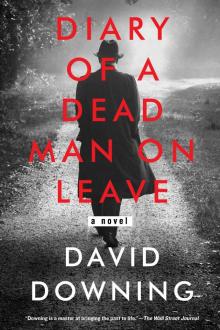 Diary of a Dead Man on Leave
Diary of a Dead Man on Leave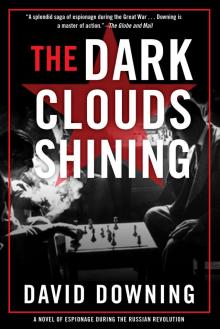 The Dark Clouds Shining
The Dark Clouds Shining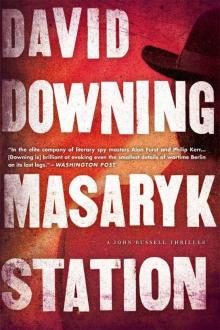 Masaryk Station (John Russell)
Masaryk Station (John Russell)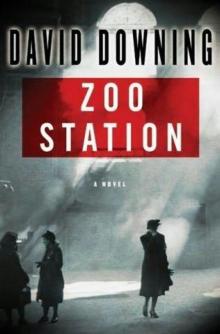 Zoo Stationee
Zoo Stationee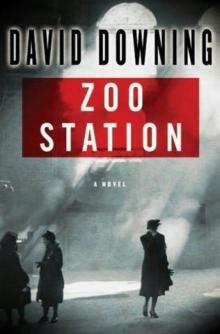 Zoo Station jr-1
Zoo Station jr-1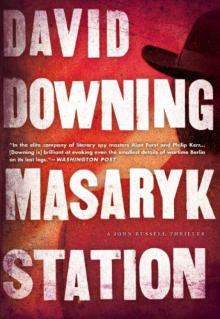 Masaryk Station
Masaryk Station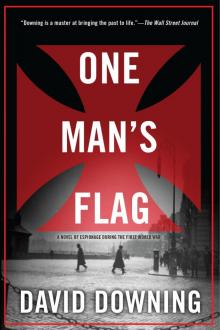 One Man's Flag
One Man's Flag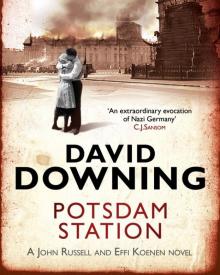 Potsdam Station jr-4
Potsdam Station jr-4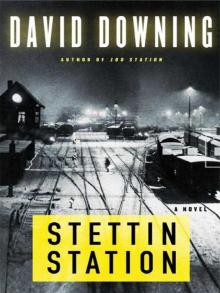 Stattin Station jr-3
Stattin Station jr-3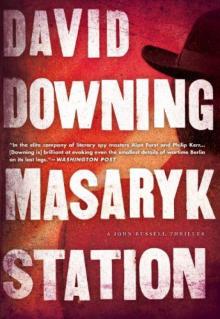 Masaryk Station jr-6
Masaryk Station jr-6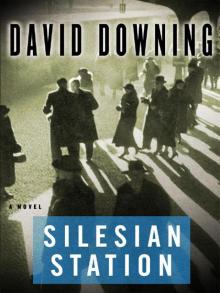 Silesian Station (2008) jr-2
Silesian Station (2008) jr-2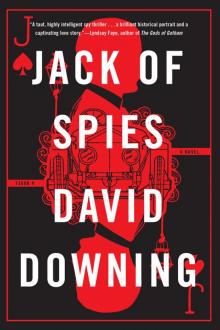 Jack of Spies
Jack of Spies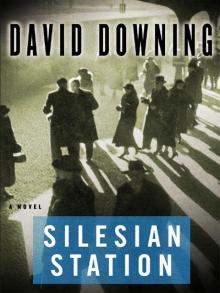 Silesian Station (2008)
Silesian Station (2008) The Moscow Option
The Moscow Option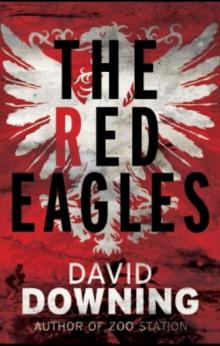 The Red Eagles
The Red Eagles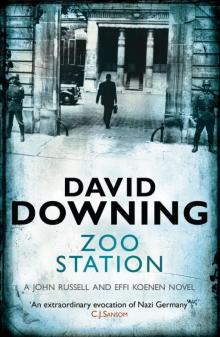 Zoo Station
Zoo Station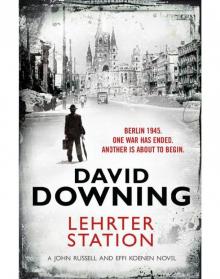 Lehrter Station
Lehrter Station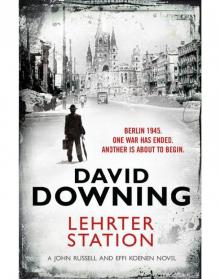 Lehrter Station jr-5
Lehrter Station jr-5